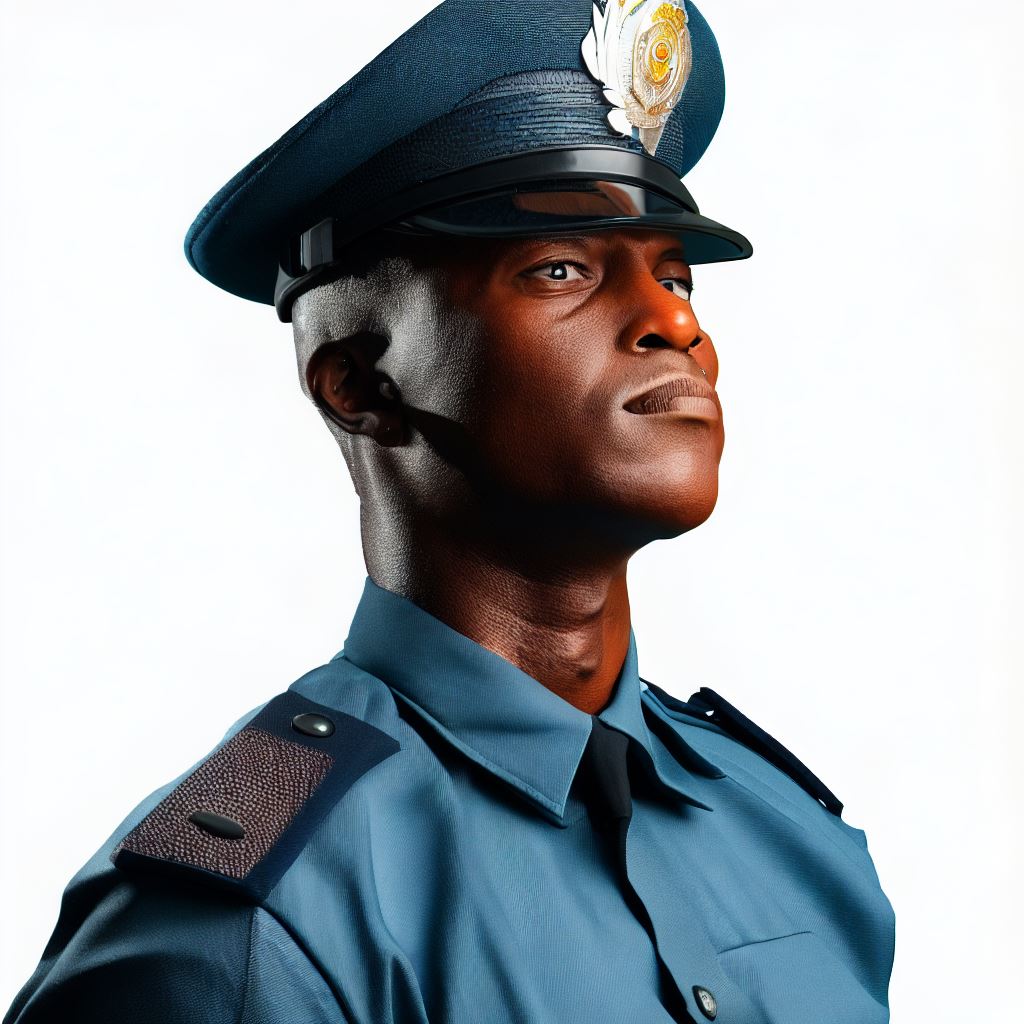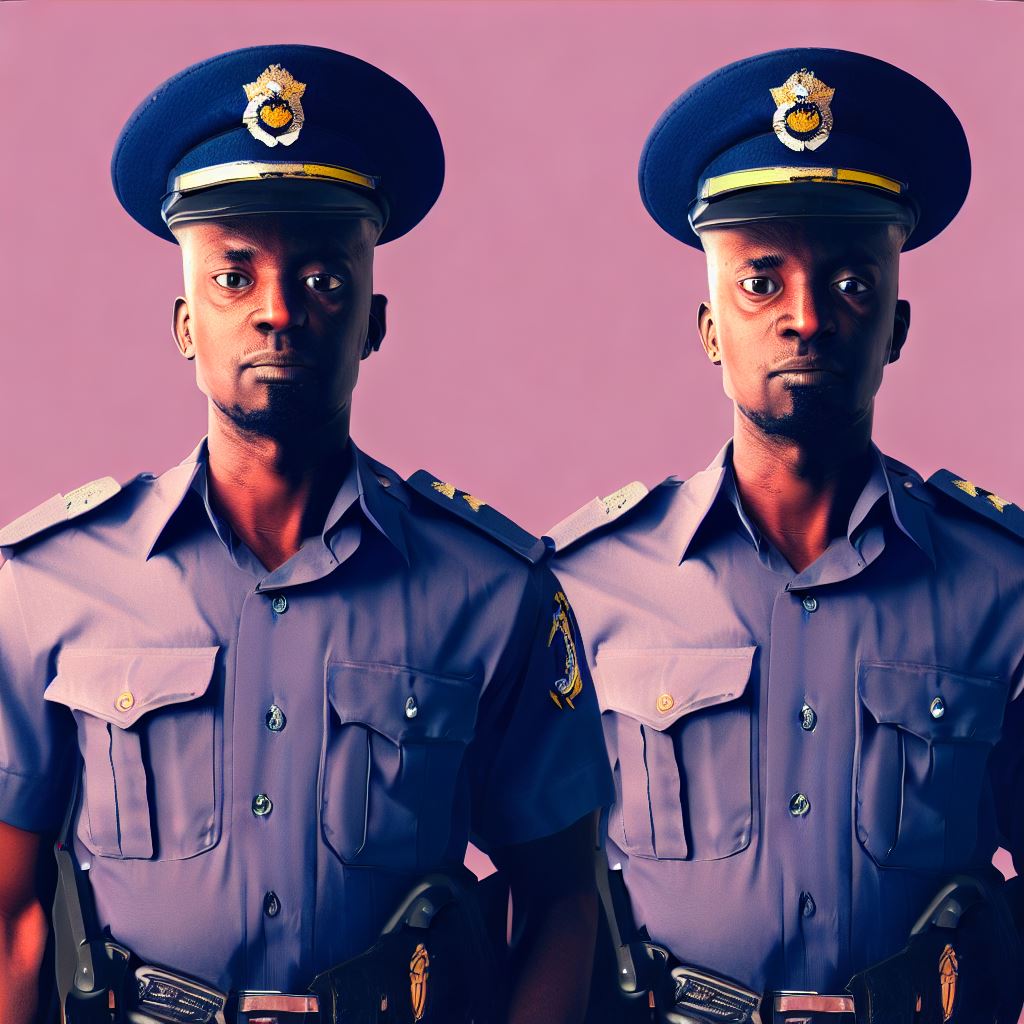Introduction
Nigerian police officers play a vital role in ensuring the safety and security of the Nigerian people. They enforce laws and maintain order, serving as the guardians of the community.
In this blog post, we aim to shed light on the daily life of a Nigerian police officer, offering insight into their duties, challenges, and contributions to society.
Through this post, we will delve into the demanding yet honorable responsibilities they undertake on a regular basis.
Overview of Nigerian Police Force
The Nigerian Police Force (NPF) is the principal law enforcement agency in Nigeria. It was established in 1930.
A. History of the Nigerian Police Force
The Nigerian Police Force can trace its roots back to the 1861 formation of the Lagos Police.
Initially, the force was under the British colonial administration and operated with a paramilitary structure.
After Nigeria gained independence in 1960, the force was restructured and became the Nigerian Police Force in 1979.
Over the years, the NPF has evolved to tackle crime, maintain law and order, and protect the citizenry.
B. Primary Responsibilities and Duties of Nigerian Police Officers
- The Nigerian police officers are responsible for enforcing laws, preventing and investigating crimes, and maintaining peace.
- They are tasked with protecting lives and properties, ensuring public safety, and upholding human rights.
- Police officers carry out patrols, respond to distress calls, and mediate disputes among members of the community.
- They also work closely with other security agencies to combat organized crime and terrorism.
C. Challenges Faced by Nigerian Police Officers
- Lack of adequate funding and resources hampers the effectiveness of Nigerian police officers.
- Inadequate training and capacity building opportunities hinder their professional growth and competency.
- High levels of corruption within the force tarnish the image of individual officers and the institution as a whole.
- Exposure to dangerous situations, violence, and regular confrontations with criminals increase the risks associated with their job.
- Inadequate welfare packages, low salaries, and poor working conditions contribute to low morale among police officers.
Despite these challenges, Nigerian police officers continue to work diligently to maintain law and order in the country.
Efforts are being made to address these issues and enhance the effectiveness of the NPF.
It is essential for the government, civil society, and the public to collaborate in supporting the Nigerian Police Force, providing resources, training, and institutional reforms that will enable officers to carry out their duties effectively.
Only by addressing the challenges faced by police officers can we create a safer and more secure environment for all Nigerians.
Read: Understanding Police Ranks and Structures in Nigeria
Entry into the Force
A. Recruitment process for becoming a Nigerian police officer
- Applicants must be Nigerian citizens with a minimum age of 18 years old.
- Application forms can be obtained from the police headquarters or online.
- Completed forms are submitted with required documents such as educational certificates and birth certificate.
- Candidates undergo a series of screening tests to determine their physical and mental suitability.
- This includes a written examination to assess general knowledge, aptitude, and reasoning skills.
- Successful candidates proceed to the next stage, which involves physical fitness tests.
- Physical fitness tests evaluate the candidate’s agility, endurance, and overall fitness level.
- Medical examinations are conducted to ensure candidates are free from diseases or physical disabilities.
- Background checks are carried out to verify the candidate’s character and moral standing.
- Those who pass all the tests are invited for an interview with senior police officers.
- The interview aims to assess the candidate’s communication skills, problem-solving abilities, and commitment to duty.
- Upon successful completion of the interview, candidates are selected and offered admission into the police academy.
B. Training and education required
- Selected candidates undergo rigorous training at the police academy for a period of six months to one year.
- The training covers various aspects such as law enforcement, community policing, and self-defense techniques.
- Classes are conducted on subjects like criminal justice, human rights, and investigative procedures.
- Practical exercises including firearms training, physical combat techniques, and emergency response drills are also included.
- During the training, candidates are instilled with discipline, respect for authority, and a sense of professionalism.
- They are taught ethics and the importance of upholding the rule of law while carrying out their duties.
C. Qualifications and qualities sought in candidates
- A minimum of a secondary school certificate is required, while higher education may be an added advantage.
- Physical fitness and good health are essential to withstand the demanding nature of police work.
- Candidates should possess strong communication skills to interact effectively with the public.
- Problem-solving skills and quick decision-making abilities are highly valued in potential police officers.
- Good character, honesty, and integrity are crucial qualities that candidates must possess.
- Leadership potential and the ability to work well in a team are desirable qualities sought in candidates.
- Candidates should have a genuine commitment to serve and protect the community.
- Resilience and the ability to handle emotionally challenging situations are important attributes.
- Knowledge of the law and the ability to apply it in practical scenarios is a valuable asset.
Entry into the Nigerian police force involves a stringent recruitment process, followed by comprehensive training.
Candidates need to demonstrate not only their physical and mental capabilities but also possess qualities that align with the objectives of the police force.
Read: Life as a Military Officer’s Spouse in Nigeria
Daily Routine and Responsibilities
A day in the life of a Nigerian police officer is filled with various tasks and duties that they handle diligently.
Here is a glimpse into their daily routine and responsibilities:
A. On Duty
- Start the day early, usually with a physical training session to stay fit and ready for duty.
- Attend morning briefing to discuss any important updates and receive instructions for the day.
- Patrol designated areas, ensuring public safety and responding quickly to emergencies.
- Enforce traffic laws, monitor road safety, and carry out regular vehicle checks.
- Investigate crimes, collect evidence, and interview witnesses to solve cases.
- Conduct regular checkpoints to prevent criminal activities and apprehend lawbreakers.
- Assist in crowd control during public events, protests, or demonstrations.
- Provide assistance and support to victims of crime, offering guidance and filing reports.
- Collaborate with other law enforcement agencies to maintain law and order.
- Prepare detailed reports of daily activities and incidents for official documentation.
B. Off Duty
- Despite being off-duty, police officers may be called upon to respond to emergencies.
- Engage in continuous training sessions to enhance skills and stay updated with new techniques.
- Participate in community outreach programs to build positive relationships with citizens.
- Maintain personal fitness and health to meet the physical demands of the job.
- Stay informed about local and national security issues to remain vigilant at all times.
- Build camaraderie with colleagues and engage in team-building exercises.
- Conduct research and attend workshops to improve knowledge of best policing practices.
- Take time to relax and recharge, knowing that duty may call at any moment.
C. Variety of Roles within the Nigerian Police Force
The Nigerian Police Force encompasses a range of roles and responsibilities, with officers specializing in different areas:
- General Duty Officers: These officers perform the daily tasks of maintaining public safety and law enforcement activities.
- Specialized Units: Police officers can join various units such as the Criminal Investigation Department, Special Anti-Robbery Squad, Anti-Trafficking Unit, or Cybercrime Unit.
- Traffic Wardens: These officers focus on traffic control, managing road congestion, and ensuring compliance with traffic laws.
- Mobile Police: They provide rapid response to emergencies, protect VIPs, and handle high-risk situations.
- Mounted Police: These officers patrol on horseback, especially in crowded areas or during events.
- Community Policing Officers: They work closely with communities to maintain peace, resolve conflicts, and prevent crime through collaboration.
In essence, a Nigerian police officer’s day is filled with a diverse range of tasks and responsibilities, both on and off duty.
They tirelessly work towards maintaining law and order, protecting citizens, and solving crimes to create a safer society for all.
Read: Medical Requirements for Military Officers in Nigeria
Community Engagement
A. Importance of community engagement for Nigerian police officers
Community engagement is of utmost importance for Nigerian police officers as it helps build trust and establish a positive relationship with the community.
By actively engaging with the local residents, officers can gather valuable information, prevent crimes, and maintain law and order effectively.
B. Initiatives taken by officers to build relationships with the community
To build relationships with the community, Nigerian police officers have initiated various programs and initiatives.
Firstly, they regularly attend community meetings and events to interact with residents and understand their concerns.
This open dialogue allows officers to address community-specific issues and establish a sense of unity.
Moreover, officers actively participate in neighborhood watch groups in order to collaborate with residents in preventing crimes and maintaining a safe environment.
These partnerships between law enforcement and the community empower individuals to actively participate in the safety of their own neighborhoods, promoting a sense of ownership and responsibility.
Another effective way that Nigerian police officers engage with the community is through educational programs.
They conduct workshops and seminars on crime prevention, road safety, and other relevant topics.
These educational initiatives not only equip community members with knowledge and skills but also foster trust and cooperation with the police force.
C. Examples of community outreach programs and activities
Community outreach programs and activities play a significant role in establishing a positive relationship between Nigerian police officers and the community.
For instance, officers organize recreational activities like sports tournaments, cultural festivals, and health camps to engage with residents in a non-threatening and enjoyable atmosphere.
These events provide opportunities for officers to interact with community members on a personal level, breaking down barriers and stereotypes.
Furthermore, Nigerian police officers actively participate in social welfare initiatives.
They collaborate with local organizations, such as NGOs and community centers, to provide support and assistance to marginalized groups.
Initiatives like crime prevention workshops for women, drug awareness campaigns, and free legal aid clinics ensure that the community feels protected and cared for by the police force.
Additionally, Nigerian police officers prioritize community policing strategies. They actively patrol the streets, interact with shop owners, and maintain a visible presence in high-crime areas.
This not only deters criminals but also demonstrates to residents that the police are accessible and dedicated to their safety and wellbeing.
In review, community engagement is crucial for Nigerian police officers as it strengthens relationships with the community, helps prevent crimes, and ensures effective law enforcement.
By actively participating in community meetings, neighborhood watch groups, educational programs, outreach activities, and social welfare initiatives, officers can foster trust and cooperation, creating a safer and more harmonious society.
The dedication of Nigerian police officers to community engagement is commendable and plays a vital role in addressing the unique challenges faced by the police force in Nigeria.
Read: Military Officer Pay: Understanding Salaries in Nigeria

Challenges and Risks Faced by Nigerian Police Officers
A. Challenges and risks faced by Nigerian police officers
In Nigeria, police officers face numerous challenges and risks on a daily basis. These challenges have a significant impact on their work and overall morale.
Let’s delve into some of the key issues they encounter:
- Corruption: The Nigerian police force has long been plagued by corruption, with officers often engaging in bribery and extortion.
- Inadequate resources: Police officers often lack the necessary equipment, training, and infrastructure to effectively carry out their duties.
- Low salaries: The meager income of Nigerian police officers often leads to frustration, making them vulnerable to corruption.
- Public distrust: Due to the prevalence of corruption and abuse of power, the Nigerian public has developed a deep distrust towards the police force.
- Workplace hazards: Nigerian police officers face a range of risks, including confrontations with armed criminals and the potential for physical harm.
- Political interference: Officers often face pressure from politicians who try to influence their actions or misuse their authority for personal gain.
- Mental and emotional stress: The nature of police work, which involves dealing with crime and violence, can take a toll on the mental health of officers.
- Inadequate training: Many police officers in Nigeria receive insufficient training, leading to a lack of preparedness in handling complex situations.
- Long working hours: Nigerian police officers are often required to work extended shifts, leading to exhaustion and reduced concentration.
- Lack of support and recognition: Police officers in Nigeria often feel unappreciated and unsupported by the government and society at large.
B. How these challenges affect the work and morale of officers
All these challenges have severe consequences for Nigerian police officers and their morale.
The continuous exposure to corruption and lack of resources not only hinders their ability to effectively serve and protect the public but also further erodes trust in the police force.
The risks associated with the job, such as encountering armed criminals, can lead to physical injuries or even loss of life.
The combination of workplace hazards, low salaries, and political interference creates a highly stressful environment for these officers.
Moreover, the inadequate training provided to Nigerian police officers puts them at a disadvantage when dealing with complex crime situations.
This lack of preparedness can result in compromised investigations and ineffective law enforcement.
The long working hours without proper rest or time off also have detrimental effects on the well-being of police officers, affecting their ability to make sound judgments and react swiftly in emergencies.
Furthermore, the lack of support and recognition from the government and society adds to the frustration and demoralization felt by Nigerian police officers.
Without proper acknowledgment and appreciation for their efforts, it becomes increasingly difficult for them to remain motivated and dedicated to their duties.
In short, Nigerian police officers face a multitude of challenges and risks that greatly impact their work and morale.
From corruption and inadequate resources to public distrust and workplace hazards, these issues undermine the effectiveness of the police force and hinder its ability to protect and serve the Nigerian people.
Personal Experiences
A. Personal experiences of Nigerian police officers
Waking up before dawn, Nigerian police officers prepare themselves mentally and physically for the day ahead.
Officer Ahmed, with 10 years of experience, recounts how he joined the force with the desire to serve his community.
B. Anecdotes, interviews, or firsthand accounts from officers
An interview with Officer Linda reveals the challenges faced by female officers in a male-dominated profession.
Sitting in a patrol vehicle, officers often start their day by visiting police stations to gather information and align strategies.
The incessant sound of sirens and the heavy traffic on Nigerian roads make the commute to their duty stations challenging.
Officer Emeka shares an anecdote of encountering a suspicious vehicle during a routine patrol, leading to the arrest of criminals.
Nigerian police officers face the daunting task of maintaining law and order in densely populated areas, tackling crimes daily.
During a riot, Officer Yusuf describes the adrenaline rush and the difficulty of resolving conflicts while ensuring public safety.
The scorching heat of Nigeria poses a physical challenge for officers as they patrol the streets on foot.
Officer Bola reveals the emotional toll of witnessing poverty, violence, and the aftermath of crime scenes regularly.
Engaging with the local community, officers build trust by organizing crime awareness campaigns and attending public events.
Officer Funke speaks about the struggles faced by Nigerian police officers due to inadequate training and limited resources.
C. Perspective on their daily lives and challenges
The lack of modern technology like dashcams or body cameras hampers the officers’ ability to gather evidence and prove innocence.
Officers often work long hours without breaks, putting their health at risk and affecting their performance on duty.
The constant pressure to meet performance targets and arrest quotas adds stress to the already challenging lives of Nigerian police officers.
Officer Ibrahim recalls the rewarding experience of rescuing a kidnapped child and reuniting them with their family.
Nigerian police officers take pride in their uniforms and badges, representing their commitment to upholding the law.
Officer Chinedu shares the joy of mentoring younger officers, passing on his years of experience and knowledge.
Despite the challenges and risks, Nigerian police officers find fulfillment in making a positive impact on their communities.
Officer Grace, with tears in her eyes, emphasizes the need for public support in order to strengthen the police force.
Nigerian police officers actively uphold peace, security, and justice for all, dedicating their lives from morning till night.
As they return home after a long day, officers rely on their families for emotional support and to unwind from the daily hardships.
With determination, Nigerian police officers continue to serve and protect, striving for a safer and more prosperous future.
Explore Further: Nigeria’s Military Strategy in a Changing World: An Analysis
Service and Sacrifice
In their line of duty, Nigerian police officers make countless sacrifices to ensure the safety and security of their community.
Their commitment and dedication to service are commendable, and they deserve our appreciation and support.
A. Sacrifices Made by Nigerian Police Officers
- Putting their lives at risk every day to protect the citizens of Nigeria.
- Working long and irregular hours, often unable to spend quality time with their families.
- Enduring physical and emotional hardships while dealing with challenging situations.
- Bearing the burden of ensuring law and order in the face of limited resources and equipment.
- Leaving behind personal aspirations and dreams to prioritize the well-being of others.
These sacrifices made by Nigerian police officers should never be overlooked or taken for granted.
The dangers they face and the challenges they encounter demand our respect and support.
B. Dedication and Commitment
Service in the Nigerian Police Force requires unwavering dedication and an exceptional level of commitment. It is a calling that demands selflessness and a deep sense of responsibility.
- Police officers are continuously training to improve their skills and enhance their effectiveness.
- They remain committed to upholding the principles of justice and fairness.
- Nigerian police officers persistently strive to maintain public order and prevent crime.
- They work tirelessly to build trust and foster positive relationships with the community they serve.
- Despite the many challenges they face, they remain resilient and steadfast in their commitment.
It is this dedicati on and commitment that allows Nigerian police officers to carry out their duties diligently and protect the lives and property of their fellow citizens.
Publish Your Professional Profile, Business or Brand
Showcase your expertise, gain trust, and boost visibility instantly on Professions.ng.
Publish NowC. Appreciation and Support for Law Enforcement
Law enforcement plays a vital role in society, and it is crucial to appreciate and support Nigerian police officers in their pursuit of justice and order.
- Recognize their sacrifices and acknowledge the risks they take to keep communities safe.
- Express gratitude through words of appreciation and encouragement.
- Participate in community programs that aim to foster positive relationships with law enforcement.
- Advocate for better resources, training, and support for Nigerian police officers.
- Stand together as a community to condemn violence and support peaceful resolutions.
When we appreciate and support Nigerian police officers, we contribute to the creation of a safer and more harmonious society. They deserve our recognition and assistance.
In a nutshell, Nigerian police officers demonstrate immense service and sacrifice as they carry out their duties to protect the community.
Their dedication and commitment should inspire us to appreciate and support law enforcement, creating a society built on trust and security.
Conclusion
The blog post has provided an insightful glimpse into the life of a Nigerian police officer.
The main points discussed include the challenges they face, such as limited resources and public mistrust, as well as the positive impact they have in maintaining law and order in society.
Nigerian police officers play a crucial role in safeguarding the community and ensuring the safety of its members.
It is important for readers to appreciate and support the work of these officers, as they strive to uphold justice and protect citizens.
By understanding the sacrifices and dedication of Nigerian police officers, we can contribute to building a safer and more harmonious society.
Let us acknowledge their efforts and express our gratitude for their service.




